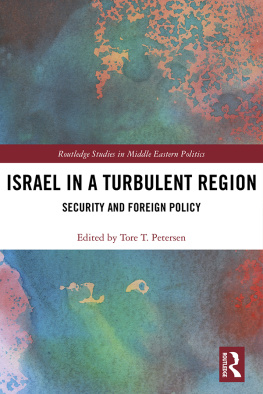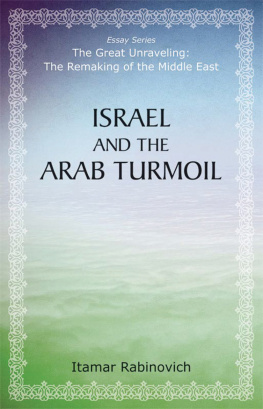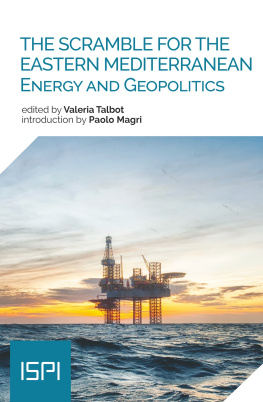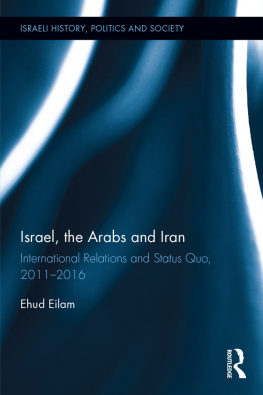Israels Mediterranean Gas
This book examines the internal and external implications of Israels natural gas discoveries in the Eastern Mediterranean. The nations changed status from being an importer of coal and oil to that of an exporter of natural gas has consequences not only for the energy sector but also for the fragile geopolitics of the region.
The book:
- Explores the challenges and issues of energy economics and governance;
- Analyses Israels gas diplomacy with its neighbours in the Middle East and North Africa and its potential positive impact on the amelioration of the Arab-Israeli conflict;
- Studies how Israel can avoid the deleterious impact of the Dutch disease once the governments share of the export revenues start flowing.
The author traces a consummate picture of history, politics, and conflicts that shape the economics of energy in Israel and its future trajectories. A major intervention in Middle East studies, this volume will be of great interest to scholars and researchers of energy studies, development studies, strategic studies, politics, diplomacy, and international relations. It will also be of interest to government agencies, think-tanks, and risk management firms.
Sujata Ashwarya is an Associate Professor in the Centre for West Asian Studies in Jamia Millia Islamia, New Delhi, India. She has published more than 30 research articles in the field of Middle Eastern studies and has written, edited, and co-edited: India-Iran Relations: Progress, Problems and Prospects (2017); Contemporary West Asia: Perspectives on Change and Continuity (co-edited; 2017); Essays on Iran and Israel: An Indian Perspective (2014); and Civil Society, Democracy and State in West Asia (edited; 2010).
Through an empirically rich and analytically sophisticated book about the emerging natural gas sector in Israel, Sujata Ashwarya makes an important contribution to the study of the challenges faced by Israel in formulating a comprehensive policy on its newly found natural gas resource, and the trials and tribulations of establishing partnerships for export of gas in the Mediterranean region.
zden Oktav, Mediniyat University, Istanbul
Initially lacking natural resources of its own, Israel has recently become a major gas producer, with ensuing dilemmas for its leaders and citizens. In this insightful and timely book, Sujata Ashwarya vividly presents Israels gas discoveries and the domestic and external challenges arising from them.
Oren Barak, The Hebrew University of Jerusalem, Israel
This is a must-read book. Sujata Ashwarya, a well-established scholar, examines the economic, political and environmental issues of energy between Israel and its neighbours. The volume makes a significant a contribution to both the academic literature and the political debate.
Gawdat Bahgat, National Defense University, Washington, DC
First published 2019
by Routledge
2 Park Square, Milton Park, Abingdon, Oxon OX14 4RN
and by Routledge
52 Vanderbilt Avenue, New York, NY 10017
Routledge is an imprint of the Taylor & Francis Group, an informa business
2019 Sujata Ashwarya
The right of Sujata Ashwarya to be identified as author of this work has been asserted by her in accordance with sections 77 and 78 of the Copyright, Designs and Patents Act 1988.
All rights reserved. No part of this book may be reprinted or reproduced or utilised in any form or by any electronic, mechanical, or other means, now known or hereafter invented, including photocopying and recording, or in any information storage or retrieval system, without permission in writing from the publishers.
Maps not to scale. The international boundaries, coastlines, denominations, and other information shown in any map in this work do not necessarily imply any judgement concerning the legal status of any territory or the endorsement or acceptance of such information. For current boundaries, readers may refer to the Survey of India maps.
Trademark notice: Product or corporate names may be trademarks or registered trademarks, and are used only for identification and explanation without intent to infringe.
British Library Cataloguing-in-Publication Data
A catalogue record for this book is available from the British Library
Library of Congress Cataloging-in-Publication Data
Names: Ashwarya, Sujata, author.
Title: Israels Mediterranean gas : domestic governance, economic
impact and strategic implications / Sujata Ashwarya.
Description: Milton Park, Abingdon, Oxon ; New York, NY :
Routledge, 2019. | Includes bibliographical references and index.
Identifiers: LCCN 2018061439 | ISBN 9781138099074 (hardback :
alk. paper) | ISBN 9780429260636 (pbk. : alk. paper)
Subjects: LCSH: Gas industryIsrael. | Natural gasEconomic
aspectsIsrael. | Natural gasGovernment policyIsrael. |
Energy policyIsrael. | Energy securityIsrael. | IsraelForeign
economic relationsMiddle East. | Middle EastForeign economic
relationsIsrael. | IsraelForeign relationsMiddle East. |
Middle EastForeign relationsIsrael.
Classification: LCC HD9581.I772 A84 2019 | DDC
333.8/233095694dc23
LC record available at https://lccn.loc.gov/2018061439
ISBN: 978-1-138-09907-4 (hbk)
ISBN: 978-0-367-20275-0 (pbk)
ISBN: 978-0-429-26063-6 (ebk)
Typeset in Bembo
by Apex CoVantage, LLC
This book is an outcome of the two-year research project on Israels natural gas resources in the Eastern Mediterranean that was sponsored by the Indian Council of Social Science Research (ICSSR) in 2014. In researching and writing this book, I received immense help from a number of people in academia, journalism, and public service in Israel, Turkey, Egypt, and India. Thanks to their informed commentaries and clarifications, I have been able to pack a sweeping number of issues relating to Israels emerging natural gas sector within the ambit of four chapters.
The contents of this volume have been greatly enriched by panels on security in the Middle East, Middle East governance, and politics of the Middle East at conferences held at National Taiwan University, Shanghai International Studies University (SISU), and Sakarya University, Turkey. At all these places, I presented papers on various facets of Israels gas sector and energy security. A travel grant from the World International Studies Committee (WISC) to participate in the 5th Global International Studies Conference in Taipei and the generous hospitality of the organisers at the Middle East Studies Institute in SISU gave me the opportunity to discuss my views with a wider audience.
This book would not have been written without the munificence of Professor Gideon Shelach of the Hebrew University of Jerusalem, who facilitated my stay on the campus in January 2016, during which I conducted most of the interviews for this book. I am grateful to Professor Rafik Turan for assisting my stay (and that of my family) in Ankara during my visit for research in Turkey. I want to thank my students, who listened to my lectures on the geopolitics of energy during the course of their learning on energy and international relations and asked useful questions that, in turn, have enhanced the sense and tenor of some of my arguments.








